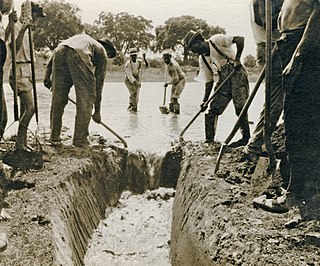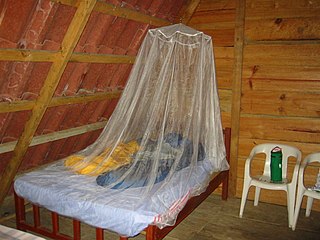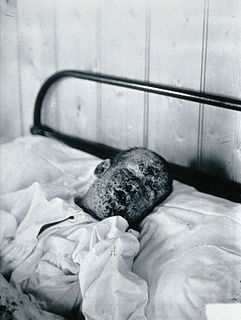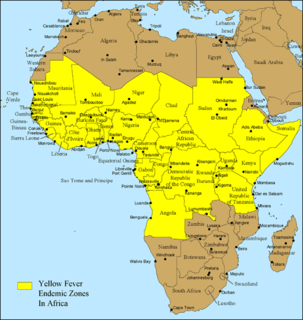Related Research Articles

Dichlorodiphenyltrichloroethane, commonly known as DDT, is a colorless, tasteless, and almost odorless crystalline chemical compound, an organochloride. Originally developed as an insecticide, it became infamous for its environmental impacts. DDT was first synthesized in 1874 by the Austrian chemist Othmar Zeidler. DDT's insecticidal action was discovered by the Swiss chemist Paul Hermann Müller in 1939. DDT was used in the second half of World War II to limit the spread of the insect-borne diseases malaria and typhus among civilians and troops. Müller was awarded the Nobel Prize in Physiology or Medicine in 1948 "for his discovery of the high efficiency of DDT as a contact poison against several arthropods".

Malaria is a mosquito-borne infectious disease that affects humans and other animals. Malaria causes symptoms that typically include fever, tiredness, vomiting, and headaches. In severe cases, it can cause jaundice, seizures, coma, or death. Symptoms usually begin ten to fifteen days after being bitten by an infected mosquito. If not properly treated, people may have recurrences of the disease months later. In those who have recently survived an infection, reinfection usually causes milder symptoms. This partial resistance disappears over months to years if the person has no continuing exposure to malaria.

Anopheles is a genus of mosquito first described and named by J. W. Meigen in 1818. About 460 species are recognised; while over 100 can transmit human malaria, only 30–40 commonly transmit parasites of the genus Plasmodium, which cause malaria in humans in endemic areas. Anopheles gambiae is one of the best known, because of its predominant role in the transmission of the most dangerous malaria parasite species – Plasmodium falciparum.
Tropical diseases are diseases that are prevalent in or unique to tropical and subtropical regions. The diseases are less prevalent in temperate climates, due in part to the occurrence of a cold season, which controls the insect population by forcing hibernation. However, many were present in northern Europe and northern America in the 17th and 18th centuries before modern understanding of disease causation. The initial impetus for tropical medicine was to protect the health of colonial settlers, notably in India under the British Raj. Insects such as mosquitoes and flies are by far the most common disease carrier, or vector. These insects may carry a parasite, bacterium or virus that is infectious to humans and animals. Most often disease is transmitted by an insect "bite", which causes transmission of the infectious agent through subcutaneous blood exchange. Vaccines are not available for most of the diseases listed here, and many do not have cures.

Vector control is any method to limit or eradicate the mammals, birds, insects or other arthropods which transmit disease pathogens. The most frequent type of vector control is mosquito control using a variety of strategies. Several of the "neglected tropical diseases" are spread by such vectors.

A mosquito net is a type of meshed curtain that is circumferentially draped over a bed or a sleeping area, to offer the sleeper barrier protection against bites and stings from mosquitos, flies, and other pest insects, and thus against the diseases they may carry. Examples of such preventable insect-borne diseases include malaria, dengue fever, yellow fever, zika virus, Chagas disease and various forms of encephalitis, including the West Nile virus.
Malaria prophylaxis is the preventive treatment of malaria. Several malaria vaccines are under development.

Eradication is the reduction of an infectious disease's prevalence in the global host population to zero.

The African Malaria Network Trust (AMANET) is a pan-African international NGO headquartered in Dar es Salaam, Tanzania. It originally started its activities as African Malaria Vaccine Testing Network (AMVTN) in 1995 with the primary goal of preparing Africa in planning and conducting malaria vaccine trials. In order to widen the scope in malaria interventions, AMVTN was succeeded by AMANET on 14 March 2002. Although the primary goal of AMANET has remained malaria vaccine development, the organization in its expanded role includes other intervention measures such as antimalaria drugs and vector control.
Sir Brian Mellor Greenwood, CBE, FRCP, FRS is a British physician, biomedical research scientist, academic, and recipient of the first Hideyo Noguchi Africa Prize.

World Malaria Day (WMD) is an international observance commemorated every year on 25 April and recognizes global efforts to control malaria. Globally, 3.3 billion people in 106 countries are at risk of malaria. In 2012, malaria caused an estimated 627,000 deaths, mostly among African children. Asia, Latin America, and to a lesser extent the Middle East and parts of Europe are also affected.

Mosquito-borne diseases or mosquito-borne illnesses are diseases caused by bacteria, viruses or parasites transmitted by mosquitoes. Nearly 700 million people get a mosquito-borne illness each year resulting in over one million deaths.
The American Society of Tropical Medicine and Hygiene (ASTMH) is an Arlington, Virginia-based non-profit organization of scientists, clinicians, students and program professionals whose longstanding mission is to promote global health through the prevention and control of infectious and other diseases that disproportionately afflict the global poor. ASTMH members work in areas of research, health care and education that encompass laboratory science, international field studies, clinical care and country-wide programs of disease control. The current organization was formed in 1951 with the amalgamation of the American Society of Tropical Medicine, founded in 1903, and the National Malaria Society, founded in 1941.
Scholarly peer review or academic peer review is the process of having a draft version of a researcher's methods and findings reviewed by experts in the same field. Peer review helps the academic publisher decide whether the work should be accepted, considered acceptable with revisions, or rejected for official publication in an academic journal, a monograph or in the proceedings of an academic conference.
Malaria Control was a volunteer distributed computing project. The project simulate the transmission dynamics and health effects of malaria. It was part of the Africa@home project.
Israel Jacob Kligler was a microbiologist. A Zionist and humanist, he was born in the Austro-Hungarian Empire, educated in the United States and spent most of his career in Mandatory Palestine, but died before the creation of the State of Israel. He was one of the first four professors of the Hebrew University and the founder of Department of Hygiene and Bacteriology of the university, which he headed until his death in 1944. Kligler was one of the pioneers of modern medical research in Mandatory Palestine, studying as varied a field as Bacteriology, Parasitology, Virology, Nutrition, Epidemiology and Public Health. He developed the Kligler Iron Agar medium for the isolation and identification of intestinal bacteria, which is still in use today.
The Malaria Eradication Scientific Alliance (MESA) is an organization founded on the research carried out by the Malaria Eradication Research Agenda (malERA). "malERA" was a project carried out by the scientific community to identify the steps and future research that must be done in order to eradicate malaria. It was created after the Malaria Forum in 2007, hosted by the Bill and Melinda Gates Foundation, reestablished malaria eradication as a long-term goal. "malERA" first launched in 2008, and resulted in a research and development agenda which was published in a PLoS Medicine magazine in 2011. MESA was formed in 2012 to continue the goals of malERA through research and development of methods to fight malaria.
Pedro L. Alonso, is a physician, epidemiologist, and researcher in diseases that affect vulnerable populations. Based on a multidisciplinary approach, his work focuses mainly on malaria, although he has also studied other infectious diseases. He served as the Director of the Global Malaria Programme at the World Health Organization between 2014 and 2022, and is currently Professor of Global Health at the Faculty of Medicine and Health Science-Hospital Clinic, at the University of Barcelona.
Target Malaria is a not-for-profit international research consortium that aims to co-develop and share novel genetic technologies to help control malaria in Africa. The consortium brings together research institutes and universities from Africa, Europe and North America.
Folake Olayinka is a physician and member on the WHO's SAGE Working Group on COVID-19 vaccines. Her experience is in routine vaccination, polio eradication, maternal and child health (MCH), HIV, and malaria programmes. Before leading the Global Immunization team on USAID's Maternal Child Survival Programme, aimed at ending preventable maternal and child deaths, she worked in the USAID Health Population and Nutrition office in Nigeria on the MCH portfolio. From 2010 to 2014, she was an inaugural member of WHO Immunization Practice Advisory Committee. based in Geneva. She serves on the WHO African Regional Immunization Technical Advisory Group and is a scientific advisor for the African Local Initiative for Vaccinology Expertise, University of the Witwatersrand, South Africa.
References
- 1 2 "About Us – MalariaWorld".
- ↑ "Malaria Eradication Scientific Alliance – MalariaWorld".
- ↑ "About us – MESA".
- ↑ "The Power of Malaria Vaccine Trials Using Controlled Human Malaria Infection". MalariaWorld.
- ↑ "Disrupting Mosquito Reproduction and Parasite Development for Malaria Control". MalariaWorld.
- ↑ "Reported bed net ownership and use in social contacts is associated with uptake of bed nets for malaria prevention in pregnant women in Ghana". MalariaWorld.
- ↑ "E-interview with Prof. Brian Greenwood (UK, 1938) – MalariaWorld".
- 1 2 3 "About MWJ – MalariaWorld".
- ↑ "Terms & conditions – MalariaWorld".